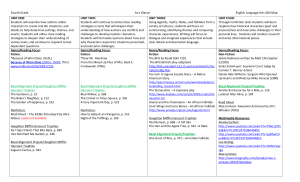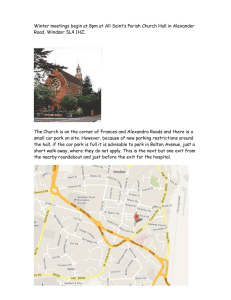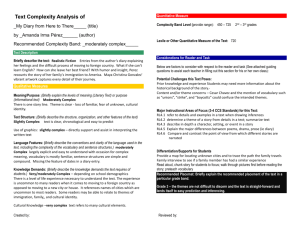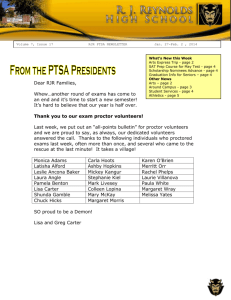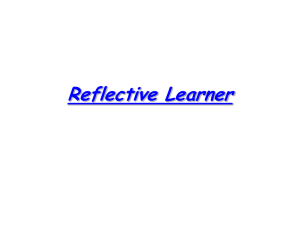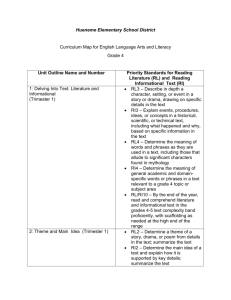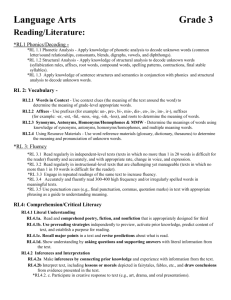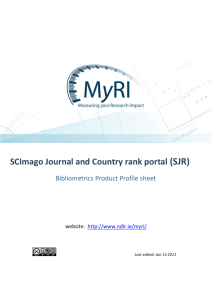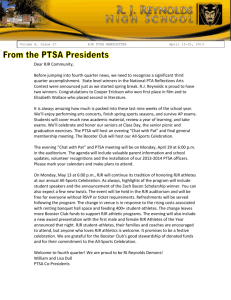Unit of Study: The Reading Life
advertisement
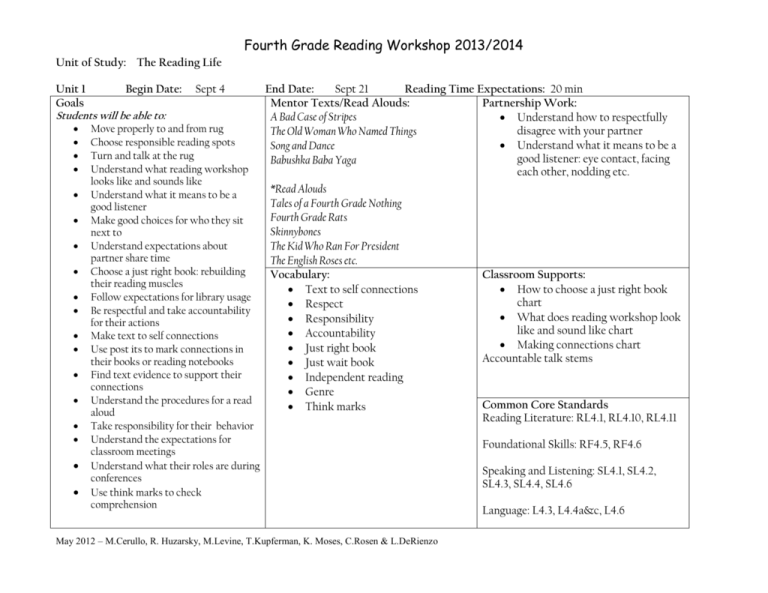
Fourth Grade Reading Workshop 2013/2014 Unit of Study: The Reading Life Unit 1 Begin Date: Goals Students will be able to: Sept 4 Move properly to and from rug Choose responsible reading spots Turn and talk at the rug Understand what reading workshop looks like and sounds like Understand what it means to be a good listener Make good choices for who they sit next to Understand expectations about partner share time Choose a just right book: rebuilding their reading muscles Follow expectations for library usage Be respectful and take accountability for their actions Make text to self connections Use post its to mark connections in their books or reading notebooks Find text evidence to support their connections Understand the procedures for a read aloud Take responsibility for their behavior Understand the expectations for classroom meetings Understand what their roles are during conferences Use think marks to check comprehension End Date: Sept 21 Reading Time Expectations: 20 min Mentor Texts/Read Alouds: Partnership Work: A Bad Case of Stripes Understand how to respectfully disagree with your partner The Old Woman Who Named Things Understand what it means to be a Song and Dance good listener: eye contact, facing Babushka Baba Yaga each other, nodding etc. *Read Alouds Tales of a Fourth Grade Nothing Fourth Grade Rats Skinnybones The Kid Who Ran For President The English Roses etc. Vocabulary: Classroom Supports: Text to self connections How to choose a just right book chart Respect What does reading workshop look Responsibility like and sound like chart Accountability Making connections chart Just right book Accountable talk stems Just wait book Independent reading Genre Think marks May 2012 – M.Cerullo, R. Huzarsky, M.Levine, T.Kupferman, K. Moses, C.Rosen & L.DeRienzo Common Core Standards Reading Literature: RL4.1, RL4.10, RL4.11 Foundational Skills: RF4.5, RF4.6 Speaking and Listening: SL4.1, SL4.2, SL4.3, SL4.4, SL4.6 Language: L4.3, L4.4a&c, L4.6 Fourth Grade Reading Workshop 2013/2014 Unit of Study: Recognizing Text Features Expository Non Fiction End Date: Oct 12 Reading Time Expectations: 20-25 min Mentor Texts/Read Alouds: Partnership Work: Students will be able to: Italian Americans Conversational prompts Identify what an expository text is Digging Up Tyrannosaurus Rex Respond or question after their partner shares Identify what expository text features are and how they support your reading: apply Time For Kids Explain their thinking with text what they already know about text features based details Weekly Reader and introduce how to interpret charts, Partner repeats what their partner graphs, diagrams, timelines, animations and says before sharing their own interactive elements thinking Make predictions about a book based on cover information Use context clues to help them develop a deeper understanding of vocabulary Vocabulary: Classroom Supports: Understand the structure of a non-fiction Glossary Making connections chart text Table of contents Conversation prompt chart Understand how to think, pair, write Index Author’s purpose chart Understand other examples of non fiction Headings Expository text features chart texts that we see everyday Sub heading I think …because… Analyze the effect of their behavior on others Text based details Common Core Standards: and their group work Author’s purpose Reading Literature: RL4.1 Develop the skill of explaining their thinking Captions Identify the main idea of a text using Reading Informational Texts: RI4.1, RI4.2, Pictures evidence from the text to support the main RI4.4, RI4.5, RI4.7, RI4.8 Charts idea Graphs Support their thinking with text based Foundational Skills: RF4.5, RF4.6 Timelines details animations Speaking and Listening: SL4.1, SL4.2, Discuss, as a group, an informational article Unit 2 Goals Begin Date: Sept 24 Understand author’s purpose Read headlines to help skim a text May 2012 – M.Cerullo, R. Huzarsky, M.Levine, T.Kupferman, K. Moses, C.Rosen & L.DeRienzo SL4.3, SL4.4, SL4.6 Language: L4.3, L4.4a&c, L4.6 Fourth Grade Reading Workshop 2013/2014 Unit of Study: Making Inferences Fiction and Poetry Unit 3 Begin Date: Oct 15 End Date: Goals Students will be able to: Understand how to make inferences Identify author’s purpose vs. author’s message and point of view Use think marks to mark their thinking as they read Make inferences using character’s language, feeling/mood, pictures, character development (thinks, says and does), prior knowledge Put themselves in the story to help them make inferences Read “in-between the lines” to understand the message of the poem Pay attention to the language and vocabulary the author uses: metaphors, similes, etc. Use visualizing techniques to help make inferences Verbalize their understanding with a partner Study a character in depth, through poetry or stories, paying close attention to change Read to find support for the inferences they make Identify the author’s point of view and narrative techniques Identify the mood of a poem Identify the theme in a text with supporting details Identify symbols as they appear in a text naming what they represent Reread to increase your understanding of a text Compare the structure elements of poetry Nov 2 Reading Time Expectations: 25 min Mentor Texts/Read Alouds: My Man Blue Hurricane Shel Silvestein Eloise Green field Jack Prelutsky James Stevenson Valerie Worth Vocabulary: Inference Verbalize Author’s purpose Author’s message Poetic Language Feeling/mood Visualize Point of view May 2012 – M.Cerullo, R. Huzarsky, M.Levine, T.Kupferman, K. Moses, C.Rosen & L.DeRienzo Partnership Work: Work with a partner to share and grow any inferences they have made Use your partner to help you understand another point of view Classroom Supports: Inference strategy chart What I read, what I inferred chart Common Core Standards: Reading Literature: RL4.1, RL4.2, RL4.3, RL4.4, RL4.5, RL4.6, RL4.7, RL4.9 Foundational Skills: RF4.5, RF4.6 Speaking and Listening: SL4.1, SL4.2, SL4.3, SL4.4, SL4.6 Language: L4.3, L4.4a&c, L4.5, L4.6 Fourth Grade Reading Workshop 2013/2014 Unit of Study: Questioning Non Fiction End Date: Nov 30 Reading Time Expectations: 25-30 min Mentor Texts/Read Alouds: Partnership Work: Students will be able to: Slinky, Scaly, Slithery Snakes Respond to each other, back and forth at least 3 times before they Use questioning to help them make sense of a Animal Senses: How Animals See, move onto a new idea text Hear, Taste, Smell and Feel Use post its to monitor their questions Generate “I wonder” and “what if” statements *National Geographic for Kids Understand what a wondering is and how it can Ranger Rick support their reading Refer to Socials Studies and Use schema to articulate all they think they Science Texts know about a topic before they read Monitor for answers to the questions they have had as they read Vocabulary: Classroom Supports: Use text features to generate and answers Questions Conversational prompt chart questions Wondering I wonder chart Self monitor as they read using their meaning, Self monitoring KWL chart syntax and visual cueing systems Support 5 W’s and question chart Ask questions using 5 W’s as they read Schema Use the answers to the 5 Ws to help you summarize Articulate Common Core Standards: Pose realistic questions that pertain to their Reading Informational Texts: RI4.1, RI4.2, reading and help them drive their reading RI4.3, RI4.4, RI4.5, RI4.7, RI4.9, RI4.10, RI4.11 Determine the main idea with supporting evidence Foundational Skills: RF4.5, RF4.6 Understand and articulate and demonstrate historical and scientific connections (cause and Speaking and Listening: SL4.1, SL4.2, effect) SL4.3, SL4.4, SL4.6 Integrate information from two different texts, synthesizing what they have learned Language: L4.3, L4.4a&c, L4.6 Unit 4 Goal Begin Date: Nov 5 May 2012 – M.Cerullo, R. Huzarsky, M.Levine, T.Kupferman, K. Moses, C.Rosen & L.DeRienzo Fourth Grade Reading Workshop 2013/2014 Unit of Study: Analyzing Text Structure Jan 11 Reading Time Expectations: 32 min Mentor Texts/Read Alouds: Partnership Work: Thunder Cake Understand ways to discuss Identify literary elements: character, setting, plot, theme, Chicken Sunday ethical issues with respect climax, problem, solution, character conflict and responsibility The Bat Boy and his Violin Explore text structure in narrative texts Debate an issue respectfully Princess and Pizza Identify the difference between fiction and non fiction in with your partner Teammates terms of literary elements Identify what a narrative text is, examining point of view Basket Moon Unit 5 Begin Date: Goals Students will be able to: Dec 3 End Date: Understand how visualizing helps support their understanding of the text Understand how setting affects the story Make text to text comparisons and connections Understand character change and identify what motivates the change Understand author’s purpose within the structure of narrative text Summarize across their fingers Determine the importance of events in a story and which events are important to hang onto Understand the difference between important and interesting/relevant vs irrelevant information Make character comparisons Determine how plot twists affect the story’s outcome Understand the sequence of events in a story (flow chart, story mountain) Understand the difference between explicit and implicit information in a text, including information gained from illustrations Identify theme and reoccurring symbols in a text Vocabulary: Literary elements Visualize Compare Text to text Character Setting Plot Problem/solution Conflict Character change Plot twist Lessons learned Ethical issues Summarize Sequence of events Implicit Explicit Story mountain climax Classroom Supports: Story elements chart What makes a story and story chart Venn diagram for comparisons T charts for comparisons Story mountain chart for sequence of events Common Core Standards: Reading Literature: RL4.1, RL4.2, RL4.3, RL4.6, RL4.7, RL4.9, RL4.10, RL4.11 Foundational Skills: RF4.5, RF4.6 Speaking and Listening: SL4.1, SL4.2, SL4.3, SL4.4, SL4.6 Language: L4.3, L4.4a&c, L4.6 Unit of Study: Making Inferences Narrative Fiction and Non Fiction May 2012 – M.Cerullo, R. Huzarsky, M.Levine, T.Kupferman, K. Moses, C.Rosen & L.DeRienzo Fourth Grade Reading Workshop 2013/2014 Unit 6 Begin Date: Jan 14 Goals Students will be able to: Make inferences about the setting and problem and solution (plot) Use clues from the text to make an inference about a subject Use evidence from the text to support their inferences Read while thinking: “I read that and this makes me think…” Reread to help make sense of the text Make inferences using prior knowledge Make inferences about character’s feelings, actions, change Understand the relationship between the main and supporting characters Identify internal and external conflict Make inferences about setting to understand how the setting affects the plot Identify the difference between an inference and information that is directly stated Make inferences to connect facts with what they are thinking End Date: Feb 15 Reading Time Expectations: 35 min Mentor Texts/Read Alouds: Amelia’s Road Pepe the Lamplighter Coming to America A Picture Book of Harriet Tubman Partnership Work: Make inferences with a partner Grow and expand their inferences with a partner Vocabulary: Inference Support Reread Classroom Supports: Inference strategy chart T-chart for the difference between inferences and directly stated information Common Core Standards: Reading Literature: RL4.1, RL4.2, RL4.3, RL4.4, RL4.6, RL4.10, RL4.11 Reading Informational Texts: RI4.1, RI4.2, RI4.4, RI4.5, RI4.6, RI4.8 Foundational Skills: RF4.5, RF4.6 Speaking and Listening: SL4.1, SL4.2, SL4.3, SL4.4, SL4.6 Language: L4.3, L4.4a&c, L4.6 Unit of Study: Analyzing Text Structure: Expository Non Fiction & Reviewing Reading Strategies May 2012 – M.Cerullo, R. Huzarsky, M.Levine, T.Kupferman, K. Moses, C.Rosen & L.DeRienzo Fourth Grade Reading Workshop 2013/2014 Unit 7 Begin Date: Feb 25 Goals Students Will Be Able To: Understand how articles are organized Use text features in an article together to deepen their understanding of the text Identify the author’s purpose Identify the authors message Find evidence to support the authors message Identify the author’s opinion and find evidence to support their thinking Take a side of an argument and support their thinking using evidence from the article Identify how authors can persuade their readers Understand how to read a map, interview, recipe, menu, instructions Identify the difference between fact and opinion Compare and contrast information from multiple texts End Date: April 5 Reading Time Expectations: 35-40 min Mentor Texts/Read Alouds: Virtual World :Community in a Computer School Uniforms: The Way To Go How to Make Ooblek Simon Sandwich Shop City of Lawrence Street Map Partnership Work: Take a side of an argument, supporting your thinking with text evidence Vocabulary: Authors message Authors purpose Evidence interview Fact/opinion Text features Classroom Supports: Fact vs. opinion chart Enlarged article with features labeled Flow charts Venn diagrams Common Core Standards: Reading Literature: RL4.1, RL4.2, RL4.3, RL4.4, RL4.5, RL4.7, RL4.10, RL4.11 Reading Informational Texts: RI4.1, RI4.2, RI4.3, RI4.4, RI4.5, RI4.7, RI4.8, RI4.9, RI4.10 Foundational Skills: RF4.5, RF4.6 Speaking and Listening: SL4.1, SL4.2, SL4.3, SL4.4, SL4.6 Language: L4.3, L4.4a&c, L4.6 Unit of Study: Book Clubs and Genre Study May 2012 – M.Cerullo, R. Huzarsky, M.Levine, T.Kupferman, K. Moses, C.Rosen & L.DeRienzo Fourth Grade Reading Workshop 2013/2014 Unit 7b Begin Date: April 8 Goals May 3 Mentor Texts/Read Alouds: Leveled sets of books Students Will Be Able To: End Date: Behave respectfully in a small group Take turns with roles of the group Participate in a conversation about their book with their group Come to their book clubs prepared to participate in a conversation about the book Use respectful body language while Vocabulary: listening book club Practice reading orally make inferences as they read respectfully disagree with group member work independently in an organized fashion use supporting evidence for your ideas Reading Time Expectations: 35-40 min Partnership Work: book club members are responsible to participate in conversations with their group on a regular basis respond to each other’s ideas before moving on Classroom Supports: Common Core Standards: Reading Literature: RL4.1, RL4.2, RL4.3, RL4.4, RL4.6, RL4.9, RL4.10, RL4.11 Foundational Skills: RF4.5, RF4.6 Speaking and Listening: SL4.1, SL4.2, SL4.3, SL4.4, SL4.6 Language: L4.3, L4.4a&c, L4.6 Unit of Study: Determining Important Ideas, Summarizing Unit 8 Begin Date: May 6 End Date: June 7 May 2012 – M.Cerullo, R. Huzarsky, M.Levine, T.Kupferman, K. Moses, C.Rosen & L.DeRienzo Reading Time Expectations: 40 min Fourth Grade Reading Workshop 2013/2014 Goals Students Will Be Able To: Identify important ideas in a text Identify the main idea of an text Find evidence to support the main idea Identify the genre of a text and understand how to get ready for reading Preview a text by paying attention to the text features Summarize a story by identifying the character, problem, solution Make inferences about reading and support their inferences with text based details Identify the difference between important ideas and supporting ideas Identify the lesson learned from the story Reread to clarify understanding Sequence details from the text Understand how to read timelines Compare and contrast information from multiple texts Mentor Texts/Read Alouds: Flight A Picture Book of Amelia Earhart In My Own Backyard A Picture Book of Rosa Parks Partnership Work: Summarize information with their partners Help each other sequence information *Test Prep Short Texts Vocabulary: Test prep language Sequencing Timelines Flow charts Summary Compare Contrast Classroom Supports: Flow charts Venn diagrams Reading comprehension strategy charts Common Core Standards: Reading Literature: RL4.1, RL4.10, RL4.11 Reading Informational Texts: RI4.1, RI4.2, RI4.3, RI4.4, RI4.5, RI4.8, RI4.10 Foundational Skills: RF4.5, RF4.6 Speaking and Listening: SL4.1, SL4.2, SL4.3, SL4.4, SL4.6 Language: L4.3, L4.4a&c, L4.6 Fourth Grade Common Core Standards Shared Reading Social Studies May 2012 – M.Cerullo, R. Huzarsky, M.Levine, T.Kupferman, K. Moses, C.Rosen & L.DeRienzo Fourth Grade Reading Workshop 2013/2014 Language: L 4.2 Reading Informational Texts: RI 4.6, RI 4.10 Additional Standards: Speaking and Listening: SL4.5 – Add audio recordings and visual displays to presentations when appropriate to enhance the development of main ideas or themes Language: L 4.4b- Use common, grade appropriate Greek and Latin affixes and roots as clues to the meaning of a word (e.g., telegraph, photograph, aotugraph). May 2012 – M.Cerullo, R. Huzarsky, M.Levine, T.Kupferman, K. Moses, C.Rosen & L.DeRienzo
